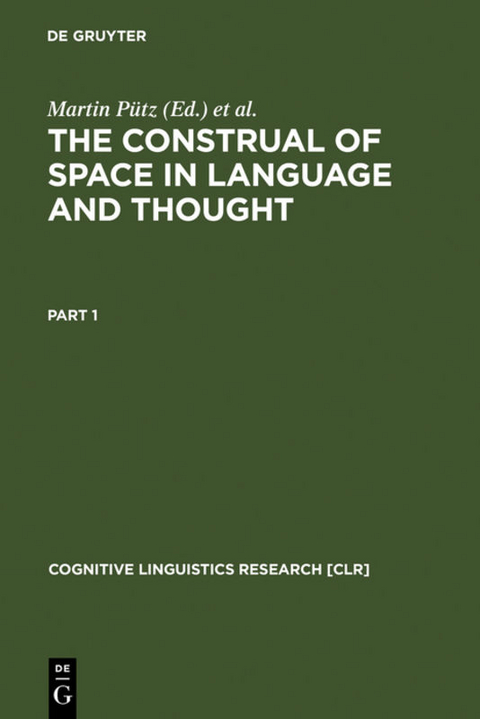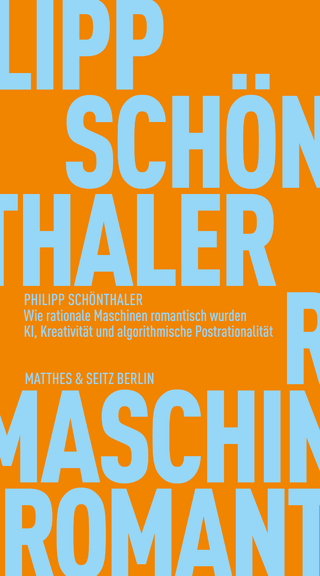
The Construal of Space in Language and Thought
Seiten
1996
|
1. Reprint 2011
de Gruyter Mouton (Verlag)
978-3-11-015243-2 (ISBN)
de Gruyter Mouton (Verlag)
978-3-11-015243-2 (ISBN)
No detailed description available for "The Construal of Space in Language and Thought".
Frontmatter -- Acknowledgements -- Introduction: Language and the cognitive construal of space / Pütz, Martin -- Part A Space in language -- Section 1: Pointing, deixis, and distance -- The Japanese verbal suffixes as indicators of distance and proximity / Cook, Haruko Minegishi -- Demonstratives as locating expressions / Mulder, Walter De -- ‘Here’ and ‘there’ in Croatian: a case study of an urban standard variety / Fuchs, Milena Žic -- Prosodic and paralinguistic signals of distance / Ozga, Janina -- Section 2: Conceptualizing space in prepositions and in morphology -- The German über / Bellavia, Elena -- The separability of German über-: A cognitive approach / Dewell, Robert B. -- Prepositional prototypes / Rice, Sally -- Space and movement in the English verb system / Inchaurralde, Carlos -- The representation of space in English derivational morphology / Kastovsky, Dieter -- Part Β Space as a cultural artifact -- Section 3: Can language use cope with space ? -- Spatial deixis in Afrikaans dictionaries / Botha, Willem J. -- What good are locationals, anyway? / Casad, Eugene H. -- Iconicity in verbal descriptions of space / Wenz, Karin -- Section 4: Variability in the conceptualization of space -- The syntax and semantics of locativised nouns in Zulu / Taylor, John R. -- Distinguishing the notion ‘place’ in an Oceanic language / Hill, Deborah -- The linguistic, cognitive and cultural variables of the conceptualization of space / Kryk-Kastovsky, Barbara -- Rethinking some universals of spatial language using controlled comparison / Neumann, Sabine / Widlok, Thomas -- Part C Space as a bridge to other conceptual domains -- Section 5: From one meaning to another -- Polarity and metaphor in German / Borneto, Carlo Serra -- Metaphors of ‘total enclosure’ grammaticizing into middle voice markers / Strauss, Susan -- Section 6: From space to time, events, and beyond -- The story of -ing: A subjective perspective / Verspoor, Marjolijn -- The temporal use of Hawaiian directional particles / Cook, Kenneth William -- Temporal meanings of spatial prepositions in Polish: The case of przez and w / Kochańska, Agata -- Viewpoint and subjectivity in English inversion / Dorgeloh, Heidrun -- How do we mentally localize different types of spatial concepts? / Zelinsky-Wibbelt, Cornelia -- Part D Space as an organizing principle of thought -- Section 7: Discourse as space -- Space in dramatic discourse / Herman, Vimala -- How space structures discourse / Mondada, Lorenza -- The (meta-)textual space / Nöth, Winfried -- Section 8: Abstract worlds as space -- From one meaning to the next: The effects of polysemous relationships in lexical learning / Frisson, Steven / Sandra, Dominiek / Brisard, Frank / Cuyckens, Hubert -- Metaphorical scenarios of science / Jäkel, Olaf -- Language, space and theography: The case of height vs. depth / Noppen, Jean-Pierre van -- List of contributors -- Subject Index
Frontmatter -- Acknowledgements -- Introduction: Language and the cognitive construal of space / Pütz, Martin -- Part A Space in language -- Section 1: Pointing, deixis, and distance -- The Japanese verbal suffixes as indicators of distance and proximity / Cook, Haruko Minegishi -- Demonstratives as locating expressions / Mulder, Walter De -- ‘Here’ and ‘there’ in Croatian: a case study of an urban standard variety / Fuchs, Milena Žic -- Prosodic and paralinguistic signals of distance / Ozga, Janina -- Section 2: Conceptualizing space in prepositions and in morphology -- The German über / Bellavia, Elena -- The separability of German über-: A cognitive approach / Dewell, Robert B. -- Prepositional prototypes / Rice, Sally -- Space and movement in the English verb system / Inchaurralde, Carlos -- The representation of space in English derivational morphology / Kastovsky, Dieter -- Part Β Space as a cultural artifact -- Section 3: Can language use cope with space ? -- Spatial deixis in Afrikaans dictionaries / Botha, Willem J. -- What good are locationals, anyway? / Casad, Eugene H. -- Iconicity in verbal descriptions of space / Wenz, Karin -- Section 4: Variability in the conceptualization of space -- The syntax and semantics of locativised nouns in Zulu / Taylor, John R. -- Distinguishing the notion ‘place’ in an Oceanic language / Hill, Deborah -- The linguistic, cognitive and cultural variables of the conceptualization of space / Kryk-Kastovsky, Barbara -- Rethinking some universals of spatial language using controlled comparison / Neumann, Sabine / Widlok, Thomas -- Part C Space as a bridge to other conceptual domains -- Section 5: From one meaning to another -- Polarity and metaphor in German / Borneto, Carlo Serra -- Metaphors of ‘total enclosure’ grammaticizing into middle voice markers / Strauss, Susan -- Section 6: From space to time, events, and beyond -- The story of -ing: A subjective perspective / Verspoor, Marjolijn -- The temporal use of Hawaiian directional particles / Cook, Kenneth William -- Temporal meanings of spatial prepositions in Polish: The case of przez and w / Kochańska, Agata -- Viewpoint and subjectivity in English inversion / Dorgeloh, Heidrun -- How do we mentally localize different types of spatial concepts? / Zelinsky-Wibbelt, Cornelia -- Part D Space as an organizing principle of thought -- Section 7: Discourse as space -- Space in dramatic discourse / Herman, Vimala -- How space structures discourse / Mondada, Lorenza -- The (meta-)textual space / Nöth, Winfried -- Section 8: Abstract worlds as space -- From one meaning to the next: The effects of polysemous relationships in lexical learning / Frisson, Steven / Sandra, Dominiek / Brisard, Frank / Cuyckens, Hubert -- Metaphorical scenarios of science / Jäkel, Olaf -- Language, space and theography: The case of height vs. depth / Noppen, Jean-Pierre van -- List of contributors -- Subject Index
| Erscheint lt. Verlag | 7.11.1996 |
|---|---|
| Reihe/Serie | Cognitive Linguistics Research [CLR] ; 8 |
| Zusatzinfo | Num. figs. |
| Verlagsort | Berlin/Boston |
| Sprache | englisch |
| Maße | 155 x 230 mm |
| Gewicht | 1450 g |
| Themenwelt | Geisteswissenschaften ► Philosophie ► Sprachphilosophie |
| Geisteswissenschaften ► Sprach- / Literaturwissenschaft ► Sprachwissenschaft | |
| Schlagworte | Allgemeine und vergleichende Sprachwissenschaft • ARCHAISCHEKERAMIK • Cognitive grammar • Dativ • Duisburg <1994> • Grammar, Comparative and general • Hardcover, Softcover / Allgemeine und Vergleichende Sprachwissenschaft • HC/Allgemeine und Vergleichende Sprachwissenschaft • HC/Englische Sprachwissenschaft, Literaturwissenschaft • Kognitive Grammatik • Kognitive Linguistik • Kongress • Kongressbericht • KUNZE-GOETT • KUNZE-GOETTE • language • LANGUAGE ARTS & DISCIPLINES • Linguistics • Linguistik • Lokalisation • OF28 • Philosophie des Geistes • Polish Language • Polnisch • Psycholinguistik • Psychologie • Raum • Raum (Begriff) • Raum, Sprache, Kongressbericht • Semantics • Semantik • space • Space and time in language • Sprache • Sprache, Raum, Kongressbericht • Sprachphilosophie • Sprachpsychologie • Sprachwissenschaft • u.a. |
| ISBN-10 | 3-11-015243-6 / 3110152436 |
| ISBN-13 | 978-3-11-015243-2 / 9783110152432 |
| Zustand | Neuware |
| Haben Sie eine Frage zum Produkt? |
Mehr entdecken
aus dem Bereich
aus dem Bereich
Macht und Legitimität politischer Sprache im Prozess der europäischen …
Buch | Softcover (2023)
Nomos (Verlag)
CHF 103,60
KI, Kreativität und algorithmische Postrationalität
Buch | Softcover (2024)
Matthes & Seitz Berlin (Verlag)
CHF 23,90
Wie die Menschheit zu ihrer größten Erfindung kam
Buch | Softcover (2022)
C.H.Beck (Verlag)
CHF 25,20


